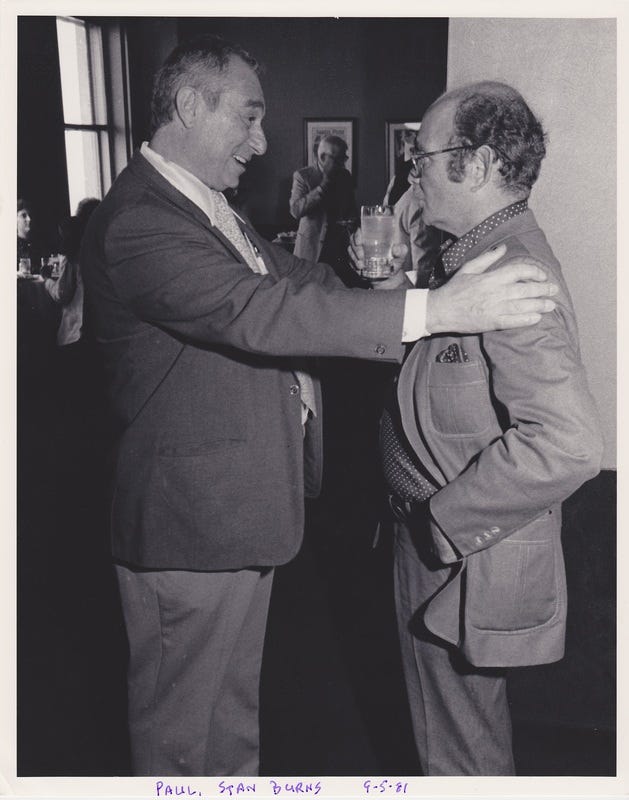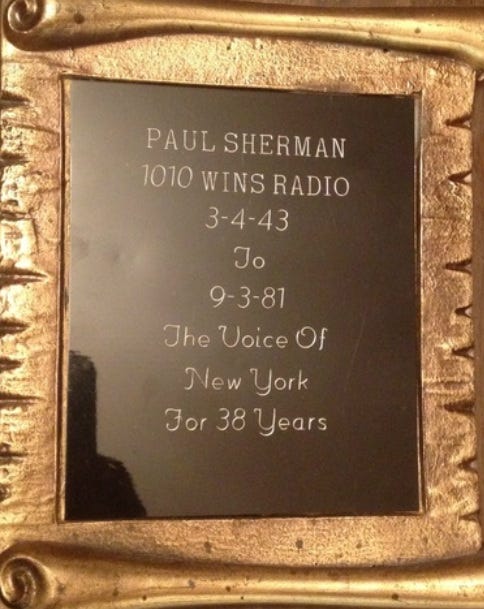My Mission In Three Words
Or, What I Learned from the BBC and the Crown Prince of Rock & Roll
What’s past is prologue, what to come in yours and my discharge. - The Tempest, Act II, scene i
Back in the 1970s, I took a class in broadcasting at Kingsborough Community College. I loved radio in those days and thought I might like to be an FM disc jockey beyond school. I wanted to understand the industry.
My instructor was Paul Sherman, an announcer on 1010WINS, our local news station where Sherman had worked since 1943. Before WINS became an all-news station on April 19th, 1965, it was a music station, and for a long time, it was the pre-eminent New York Rock & Roll station.
Paul Sherman, I learned, had subbed for, and later took over from, Alan Freed, the WINS disc jockey who had named himself “The King of Rock & Roll.” Alan Freed was famous for taking a lot of money for playing certain records (known as Payola). Paul Sherman took his place, but not the payola. Freed had dubbed Sherman “The Crown Prince of Rock & Roll.”
Mr. Sherman had a great announcer’s voice. I found a great example of his speaking voice on an album he made to teach Yiddish to children:
He was an excellent teacher with charm, grace, and a sparkling wit.
Sherman told us repeatedly that if we wanted to enter the broadcasting industry, we should go into sales, not announcing or DJing, because selling was where the money was. I heard him, but I wasn’t listening.
What I was listening to was the history. I had no idea at the time that embedded in the history of broadcasting was the guiding principle for my working life.
Wait for it…
Professor Sherman (he took giddy pleasure in having us call him ‘Professor’) drilled us on the Communications Act of 1934, which created the FCC and set the course for government regulation of future commercial communication technologies, at least as far as television.
He went back further, to the founding of the British Broadcasting Company in 1922 and its first Director-General, John Reith.
Okay, I didn’t remember Reith’s name. Had to look it up.
In any case, John Reith came up with the BBC’s stated mission: “To inform, educate, and entertain."
I’ve never forgotten those three words. In fact, looking at my careers (I’ve done a lot of reinvention), that three-word phrase has been at the core of my work as an actor, a trainer, a teacher, and a writer. I never became an announcer.
If I had a mission statement, it would be to Inform - Educate - Entertain. And not necessarily in that order. It’s a great guiding principle, and I recommend it.
One brief story: I had somehow gotten the dates mixed up and missed the final exam. I loved that class, but I didn’t want to have to take the whole class again. “Professor” Sherman was on campus, and I found him in the classroom. “I’m really sorry. I don’t know how I got it wrong!” I said.
“Got an hour?” he asked me. I nodded. “Sit down,” he said.
He grilled me for about forty minutes, mostly about the Communications Act of 1934.
“Okay,” he said, “A for the final, A for the course. Go home.”
If all my teachers had been like Paul Sherman, I might have graduated college. Maybe.
Did you have a teacher who influenced your life path? Share in the comments!







What a great story! I remember him well. You're so fortunate to have had this experience!
Inform. Educate. Entertain. All three have underpinned my career in education - undoubtedly because that seemed to be the mantra of so many of my best teachers. I've been fortunate to have many, many good teachers both in school and in university/grad school, but the one that I always go to first was my 7th grade English teacher - Gail Lathrop. Her daily double period classes were the best I'd ever had to that point and turned me onto so many different things: poetry, literature, writing, etc. She was (unfortunately, she died years ago of cancer) brilliantly creative and brought innumerable dimensions to her class. We sewed together hard-back books which we then filled with stories, poems, etc. We'd go sit at various points along the school's nature trail, write poems about what we observed and then she'd type them all out, mimeograph copies for us all and we'd critique each others' work. And, of course, we did the obligatory grammar, etc. - but that was fun, too. A true star.